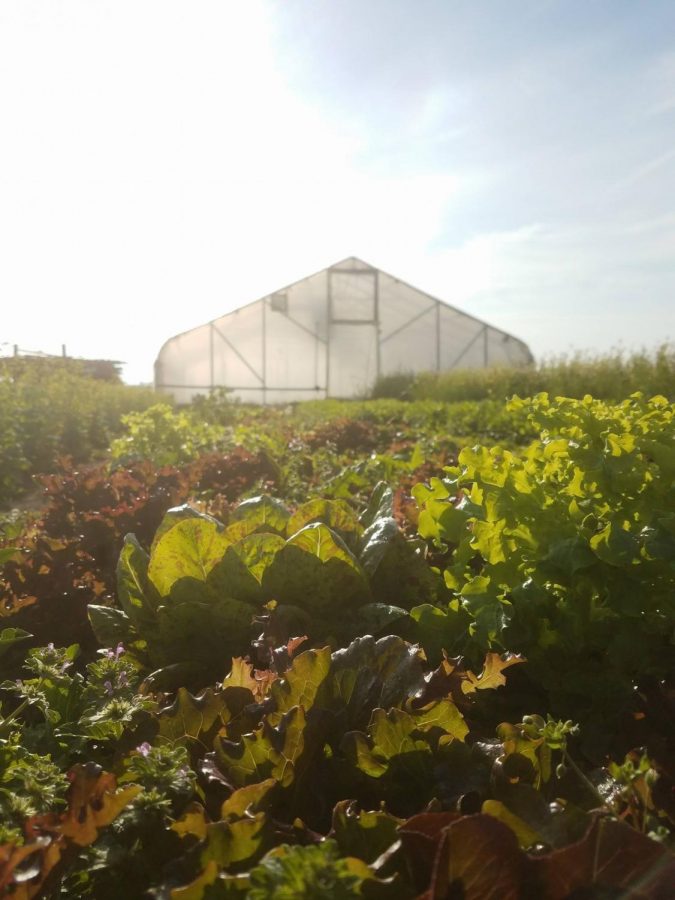Urbana farm practices sustainability
Photo courtesy of Blue Moon Farm
The Blue Moon Farm in Urbana grows vegetables for local farmer’s markets, restaurants and stores. The farm consists of 20 acres dedicated to vegetable production, and 10 high tunnels totaling just under half an acre of year-round production.
May 1, 2019
When Lorien Carsey started working on a farm as a part-time job, she was skeptical if she would even enjoy it. Some people are drawn to farming work and turns out Carsey is one of those people.
“I started in 1999, and I fell in love with the work but took a break to go to graduate school,” Carsey said. “Little did I know I couldn’t stay away. I missed the physical work, being outside and the contact with the community. I joined Blue Moon in 2009 and have just been working my way up until now with Shea as a co-owner and manager.”
Carsey and Shea Belahi are the co-owners and managers of Blue Moon Farm in Urbana.
The farm itself was founded in 1995 by John Cherniss and Michelle Wander.
According to Belahi, Cherniss had long been a farmer, and Wander had actually moved to the area to teach at the University.
Get The Daily Illini in your inbox!
In 2015, Cherniss brought Carsey and Belahi on as co-managers so he and Wander were going to take a step back.
As far as experience before joining the Blue Moon crew, both Wander and Belahi had experience either working on a farm or running their own.
Belahi said, “I had owned my own farm for a few years, it was small and I was just starting out. John reached out to me, wanting to talk about (a) potential partnership or working at Blue Moon. We all, John, Lorien and I, had a meeting and discussed what each of us working together would look like.”
There would be many pros to the job, as far as Belahi and Carsey were concerned.
For Carsey, after joining Blue Moon in 2009, she had loved the idea of bringing the type of crops that Blue Moon had to the community, so taking a larger role as an owner was even more exciting.
Working at Blue Moon Farm gave Belahi equipment and products she had long been seeking.
“John had already had this whole farm established and the equipment that I had been seeking and wondering how I was going to get on my own,” Belahi said.
Belahi said she also found joy in both the process and product her work gave her.
“There were so many people working and buying from the farm so I immediately had a support network that I didn’t have with my own farm because it was so much work that I had done on my own,” Belahi said.
Blue Moon’s goals have only been strengthened with the addition of Carsey and Belahi.
At Blue Moon, the farmers preach about keeping the soil quality healthy, both for the farm and for the products that are being sold to consumers. The farm, who has been certified organic since 1999, is committed to sustainable farming practices.
“Through the years of farming, farmers can take and take from soil and wear it out,” Belahi said. “We use cover croppings, and grow things that help with weed suppression naturally and add back to the soil. There are so many precautions that we can take to keep the soil healthy.”
Their treatment of the environment and the soil is something Carsey said “directly affects the taste and quality of the crops, which is important to our consumers.”
Fresh crops are regarded highly by customers.
Belahi described their focus as “connecting directly with our consumers: the customers. Our biggest sales are direct to consumers through things like farmers markets and through our Community Supported Agriculture (CSA).”
To the farmers at Blue Moon, the most important link and one of the main focuses on the farm is how to reach our community.
They do this through farmer’s markets and quality crops.
“We bring crops with the quality and taste that you can’t find in the grocery stores,” Belahi said. “When people try vegetables from the store and then try ours, and are blown away by the difference, it changes their mind about the vegetables.”
Belahi and Carsey often work the farmer’s markets for Blue Moon and are happy to see the customers excited about the variety of their crops.
“I see familiar faces that light up when we bring crops,” Carsey said. “Seeing people so excited when we bring fresh heirloom tomatoes that they think are delicious. Tomatoes are grown for grocery stores with taste and quality in mind.”
“Knowing about their customers and consumers (is important),” Belahi said. “They care about us as much as we care about them, and that is really important. The relationship you build with people is really special to us.”






